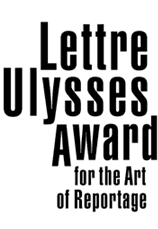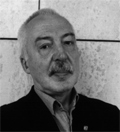
Andrei Bitov, Russia
 “While in Georgia I wrote about Russia, while in Russia about Georgia. Why must I be plagued by visions of Tbilisi in the village of Golusino near Kostroma or in Golizyn near Moscow, only to write about Leningrad Zoo once I was finally in Tbilisi!”
“While in Georgia I wrote about Russia, while in Russia about Georgia. Why must I be plagued by visions of Tbilisi in the village of Golusino near Kostroma or in Golizyn near Moscow, only to write about Leningrad Zoo once I was finally in Tbilisi!”
“If I had lived in the 19th Century I would have been an explorer. That is my character. And even in the 20th Century I would have liked to have travelled the world. But that wasn’t allowed. And the country was so vast. So against my will I became an imperiologist – a science that I invented myself. Externally I was a traveller through the empire, but internally I was someone who was trying to get closer to the meaning of life. I can only do that when I write. I understand nothing until I have written it down.”
Novelist, writer, geologist. Andrei Bitov was born in Leningrad in 1937. During the Second World War and the siege of his home city, he was evacuated with his mother, first to the Urals and then to Uzbekistan, before returning in 1944. He studied mining and geology from 1955 to 1962 and took part in numerous research expeditions. Some of his first short stories were published in 1959 and in 1963 having decided to pursue writing fulltime he moved to Moscow, becoming a member of the Soviet writers union in 1965. In 1967 he completed his further studies in directing and scriptwriting and his doctoral studies at Moscow’s Institute for World Literature.
In 1967 Bitov travelled to Armenia for the first time, and was fascinated by the country, its history and its people. He repeatedly visited the then Soviet Republic and eventually published his travel memoir Lessons of Armenia in 1969. The book was cut and censored by the Soviet authorities and Bitov updated his original complete version and republished it in 2002. His other great travel reportage Choosing a Location: Georgian Album, was first published in Russia in 1985. The two works are published together in English as A Captive of the Caucasus.
Bitov first became well known internationally through his novel Pushkin House. The book was originally published in Russian in 1978 by the Ardis publishing house (USA) and appeared for the first time in English in 1987. This complex work – which is considered one of the first postmodern novels – deals with the story of one family and the recent Stalinist past, as well as the history of Russian literature. It is also a literary experiment with the novel form, as well as a bitter parody of the Russian intelligentsia and a book about writing. In 1989 the book was awarded the Andrei Belyi Prize (Leningrad), and the French Prize for the Best Foreign Book and in 1990 it received the Pushkin Prize, awarded by the Alfred Töpfer Foundation in Germany.
During the 1970s Bitov worked as a screenwriter on several films, the best known of which is On Thursday and Never Again (1977), which was directed by Anatoli Efros. He always kept himself at an ironic distance from political events in the Soviet Union. Initially he was officially tolerated as a writer until he became co-publisher of the underground magazine Metropol in 1979, which brought him into conflict with the authorities and which caused his works to be banned or censored. It is only since Perestroika and Glasnost that his books have been available in their complete uncensored form. His works include the collections of short stories Life in Windy Weather (1991) and Ten Short Stories (1995), and the novels The Light of the Dead (1990), Monkey Link. A Pilgrimage Novel (1994), People in Landscape (1994) and Pushkin’s Hare (1999). His latest works are The Empire in Four Dimensions (2002), a collection of his impressions and observations from 1960 to 1993, Pushkin in Russia (2003) and the novel Taste (2004). Bitov is now recognized as one of the most important Russian writers of his generation, to whom conventional labels do not apply. His writing continues to remain outside any formal genre, encompassing the novel, travelogue, memoir, literary essay and reportage.
Andrei Bitov has been the recipient of numerous awards and has been named a Chevalier des Arts et Lettres by the French government. In 1992/1993 he was a guest of the Institute for Advanced Study in Berlin. He was one of the co-founders of the Russian PEN Club and has been its president since 1991. In 2003 he became the vice-president of the International PEN Club. Bitov has been a visiting lecturer at many European and American universities and received an honorary doctorate from the Yerevan University, Armenia in 1997. His essays and articles have appeared in many publications, including Glas, DU, Lettre International and Wespennest.
Andrei Bitov’s works have been translated into many languages including English, German, Swedish, French and Italian. Bitov speaks Russian, and English, and lives in Moscow and St. Petersburg.
